
COVID-Blog
Status of HIV Programmes in Botswana
20 February 2025
20 February 2025 20 February 2025Documented Impact on Services:
Government Support: HIV programmes are primarily (60%) supported by the government, with public health facilities operating normally.
Service Disruptions: All key population drop-in centres are closed, limiting access to services.
Workload and Quality: Increased workload for government staff may hinder adequate monitoring of adherence and retention for clients on treatment. There is a risk of losing trained staff, which could lead to poorer service quality.

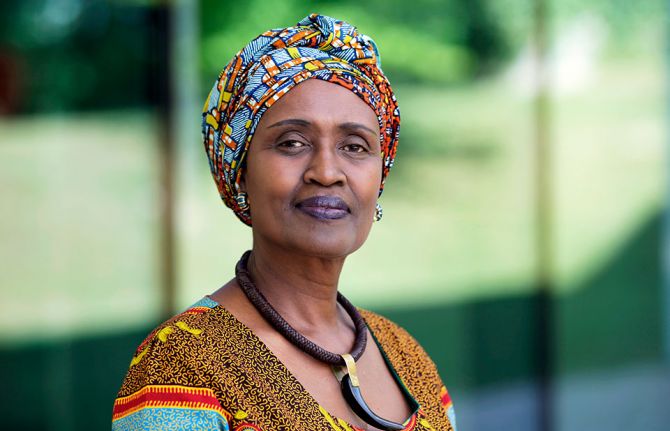
COVID-Blog
A global vaccine apartheid is unfolding. People’s lives must come before profit
03 February 2021
03 February 2021 03 February 2021This article first appeared in The Guardian
By Winnie Byanyima, UNAIDS Executive Director
Nine months ago world leaders were queuing up to declare any Covid-19 vaccine a global public good. Today we are witness to a vaccine apartheid that is only serving the interests of powerful and profitable pharmaceutical corporations while costing each one of us the quickest and least harmful exist route from this crisis.
I am sickened by last week’s news that South Africa, a country whose HIV history should have taught us all the most appalling life-costing consequences of allowing pharmaceutical corporations to protect their medicine monopolies, has had to pay more than double the price paid by the European Union for the AstraZeneca vaccine for far fewer doses than it actually needs. Like so many other low and middle-income countries, South Africa is today facing a vaccine landscape of depleted supply where it is purchasing power, not suffering, that will secure the few remaining doses.
Nine out of 10 people living in the poorest countries are set to miss out on a vaccine this year. Production delays put even this figure in doubt. Unjustifiably high prices block access and threaten to push more countries into an ever-deeper debt crisis. If we continue to pursue the vaccine model we have, we will fail to get this pandemic under control for years to come.
Failure to change course will come at the cost of millions of lives and livelihoods around the world; to our progress on tackling poverty; to businesses, including those represented here at the World Economic Forum this week; and to our collective public health and economic security. Because make no mistake, the costs of vaccine inequality will not be confined to those living in the poorest countries.
The longer the virus is allowed to continue in a context of patchy immunity, the greater the chance of mutations that could render the vaccines we have and the vaccines some people in rich countries have already received, less effective or ineffective.
Research commissioned by the International Chamber of Commerce published this week predicts that delays to vaccine access in poorer nations will also cost the global economy an estimated $9 trillion, with nearly half of this absorbed in wealthy countries like the United States, Canada, Germany, and the United Kingdom.
We cannot rewind the last nine months or the failure so far of governments to enact their pledge to make Covid-19 vaccines global public goods. But we can and we must act now to change the otherwise catastrophic trajectory of this pandemic. The vaccine science, know-how and technology paid for in large part by over $100 billion of taxpayers’ money, can no longer be treated as the private property of pharmaceutical corporations. Instead, these must be shared openly, via the World Health Organisation’s Covid Technology Access Pool so that more manufacturers can be brought on board and a global plan put in action to scale up vaccine production.
To clear the pathway for this, governments must also urgently back the proposal tabled to the World Trade Organisation to temporarily waive intellectual property rights for COVID 19 vaccines, treatments and tests until the world has reached critically needed herd immunity and this pandemic is under control.
Almost every business on the planet has had to step away from business as usual as a result of this pandemic. It is in all our interests that pharmaceutical corporations now do the same. I invite governments and business leaders to join the growing call for a People’s Vaccine and together chart a new path that can secure enough vaccines, tests and treatments for all people in all nations.

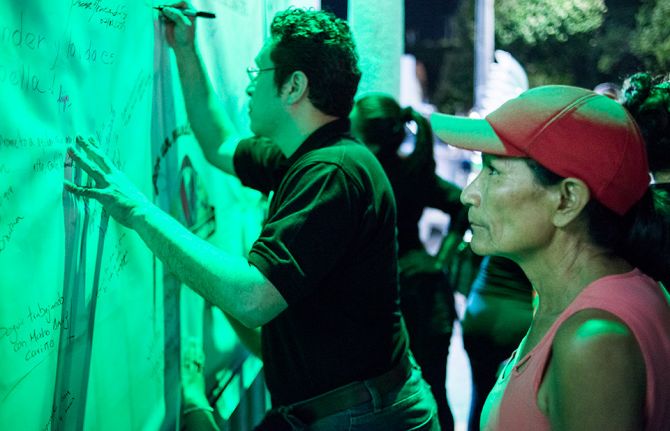
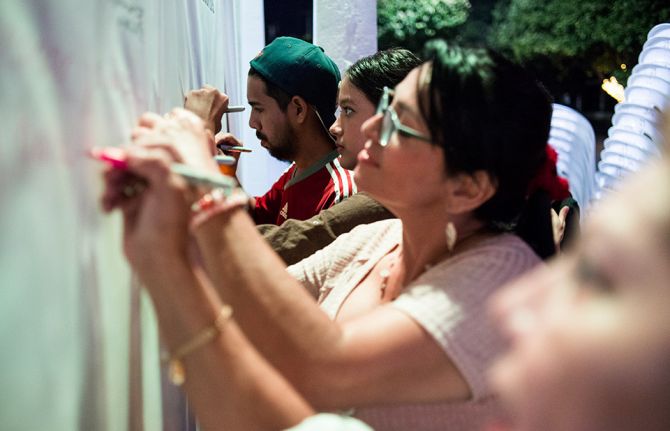
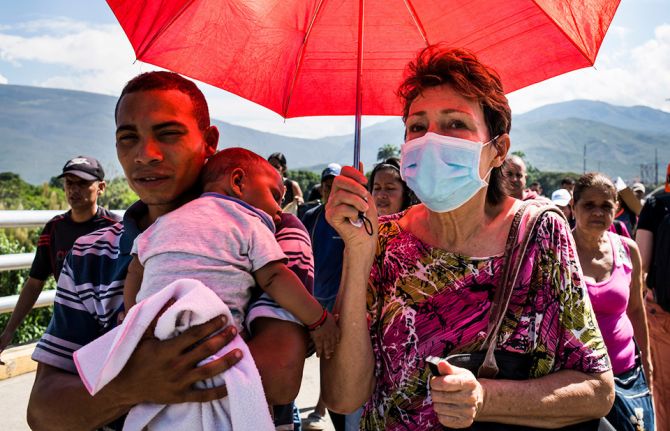
COVID-Blog
26 organizations to receive funding to address HIV and COVID-19 in Latin America and the Caribbean
07 October 2020
07 October 2020 07 October 2020As a result of the 2020 Call for Strengthening community-based organizations in the response to HIV in Latin America and the Caribbean in the context of COVID-19, UNAIDS received 133 project proposals that met the eligibility criteria of which 26 have now been selected to receive funding for their implementation.
Several online surveys conducted by UNAIDS in the region since the beginning of the COVID-19 pandemic have showed the diverse vulnerabilities of people living with or affected by HIV, not only in terms of COVID-19 prevention, but also in HIV prevention, access to treatment and human rights violations. Therefore, the selected projects are aimed at addressing the challenges that countries face when responding to the two converging epidemics of COVID-19 and HIV as well as strengthening the role of community organizations to mitigate the vulnerabilities of the people affected by the epidemics, including key populations and people living with or vulnerable to HIV.
The selected projects will be implemented in 16 different countries of the region including Argentina, Brazil, Chile, Colombia, Costa Rica, Dominican Republic, Ecuador, El Salvador, Guatemala, Guyana, Honduras, Mexico, Panama, Paraguay, Peru and Venezuela.

COVID-Blog
Providing HIV treatment to people living with HIV stranded in foreign countries in Middle East and North Africa region during the COVID-19 pandemic
08 September 2020
08 September 2020 08 September 2020Due to COVID-19 people living with HIV around the world, including the Middle East and North Africa region, are encountering difficulties to access HIV treatment, especially when they are unexpectedly stranded in a foreign country due to travel restrictions.
“I came to Egypt on 1 March on a business trip and my plan was to leave on 4 April. Due to the COVID-19 and the closing of the airports, I had to extend my stay in Egypt. Unfortunately, my medication is not available in Egypt,” said Hammad.
To overcome this challenge, UNAIDS has been coordinating efforts with governments, partners and civil society organizations to ensure everyone in need of HIV treatment could have access to it by linking people with local networks and mobilizing government officials in the Middle East and North Africa region.
In the case of Hammad, UNAIDS and WHO together with the Network of people living with HIV in Lebanon, coordinated the delivery of three-month stock of HIV treatment. “I’m really thankful for all the humanitarian parties who helped me during this crisis, I couldn’t have done anything otherwise,” said Hammad.
In Jordan, UNAIDS coordinated with its partner Forearms of Change to provide HIV treatment to two transgender women stuck in the country. “Due to the global situation of the coronavirus, I was stranded in Jordan and my pills ran out! But UNAIDS linked me and my friend with Forearms of Change and this amazing organization supporting people living with HIV helped solve this vital issue! I am very grateful to everyone who has given me tremendous help!” said Kasia.
“We are really happy to know that we managed to give support and happiness to these two women who were very frightened when we saw them because they were stranded in Amman due to the lockdown. Providing them with the needed medicine without any questions was the only thing that managed to put a smile back on their faces,” said Abdalla Hanatleh, Director of Forearms of Change in Jordan.
Supporting people living with HIV stuck in countries with strict travel restrictions remains a constant challenge.
“We are committed to continue ensuring that people living with HIV get the services they need,” said Rangaiyan Gurumurthy, acting UNAIDS Regional Director for the Middle East and North Africa region. “We would not have been able to do all this, if it weren’t for the successful partnerships with governments and other partners and the commitment of civil society organizations in the region.”
Since the COVID-19 pandemic hit, UNAIDS has helped stranded people to obtain HIV medicine in countries as diverse as Canada, China, Latvia, Myanmar, Ukraine, Egypt, Kuwait and Jordan.

COVID-Blog
New website with COVID-19 related resources for young key populations and young poeple living with HIV in Asia and the Pacific
27 August 2020
27 August 2020 27 August 2020The Interagency Task Team on Young Key Populations (IATT on YKPs) in Asia and the Pacific, with support from Youth LEAD, UNAIDS, UNICEF and UNDP, has launched its new website.
The aim of the website is to gather and bring together available information and guidance on COVID-19 focusing on young key populations (YKPs) and young people living with HIV (PLHIV) from Asia and the Pacific. The platform will serve as an online resource to document and communicate on the challenges YKPs face due to COVID-19 as well as their approaches in identifying gaps and solutions in their response to COVID-19.
Materials on the website include a wide range of resources for YKPs, such as personal stories, guidance on what young people can do to look after themselves and their communities during COVID-19 as well as a collection of best practices and strategic information on young key populations during COVID-19 that can be used for evidence-informed programming.

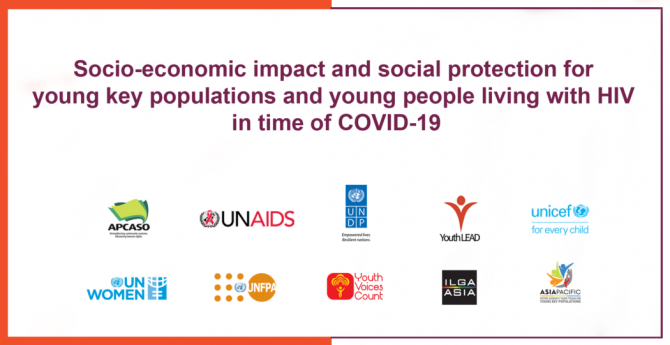
COVID-Blog
Restrictive measures to curb the spread of COVID-19 are affecting young key populations in Asia and the Pacific
27 August 2020
27 August 2020 27 August 2020The Interagency Task Team (IATT) on young key populations (YKPs) in Asia and the Pacific, co-chaired by UNAIDS, UNDP and APCASO, released the third set of findings from a survey assessing the needs and ability of young key populations to access information, treatment and other HIV services during COVID-19.
Findings from the assessment reveal that restrictive measures meant to curb the spread of COVID-19 have led to a loss of income and employment. Widespread quarantines have left many YKPs, particularly those working in the informal economy, without a source of income. 45% of the respondents stated that they did not have access to food supply and 10% did not have access to clean water during the COVID-19 outbreak. The pandemic is also having an impact on education systems. According to 36% of the respondents, the restrictive measures prevented them from accessing school or college.
In response to the COVID-19 pandemic, countries in Asia and the Pacific have sought to expand existing social security programmes or introduce new schemes, as advised by the International Monetary Fund. However, in several countries, there are still large gaps in coverage and the new schemes fall short of appropriately reflecting the devastating impacts that COVID-19 is having on the most vulnerable populations.
The IATT on YKP has developed a set of recommendations with a specific focus on YKPs and young people living with HIV addressed to governments and other stakeholders to strengthen social protection systems as a critical response to the COVID-19 crisis. Among others, the IATT on YKPs stressed that measures should include access to national social protection schemes, income support schemes and emergency social protection measures for all during the COVID-19 pandemic.

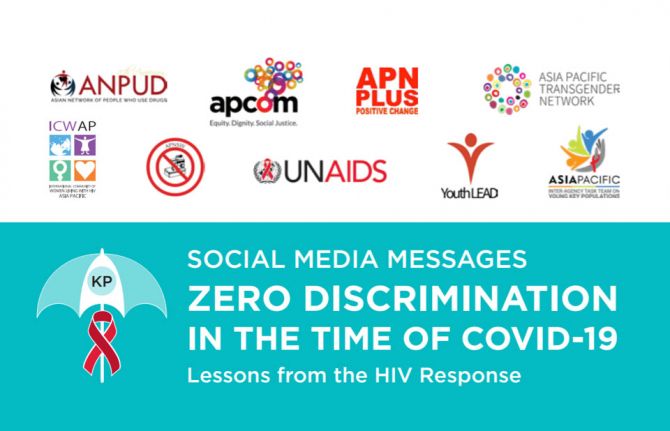
COVID-Blog
Social media against discrimination in Asia and the Pacific
24 August 2020
24 August 2020 24 August 2020In light of this rise of discrimination in Asia and the Pacific against vulnerable groups and health care professionals due to COVID-19, regional networks of key populations, including ANPUD, APCOM, APN+, APNSW, APTN, ICW AP and Youth Lead and the Inter-Agency Task Team on young key populations, have partnered with UNAIDS to develop a social media package and a set of key messages to advocate for a more respectful discourse on and offline.
Drawing on the lessons learned from the HIV response, the campaign is urging people to act with kindness, not stigma and discrimination, and respect people living with HIV, key populations and people affected by COVID-19.
Through this online campaign, key population networks and UNAIDS are calling on partners to promote inclusion, compassion, and the right of everyone to live a full and productive live with respect and dignity.

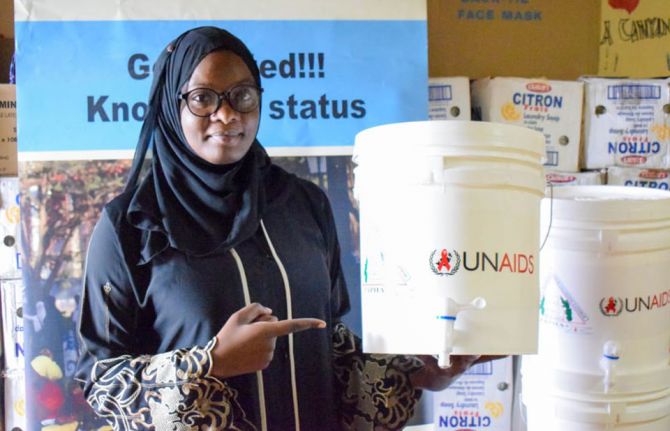
COVID-Blog
UNAIDS donates supplies and equipment to communities in Zanzibar
21 August 2020
21 August 2020 21 August 2020UNAIDS in collaboration with the Zanzibar Association of People living with HIV/AIDS (ZAPHA+), the Zanzibar HIV Control Program, the Zanzibar Ministry of Health and the local Shehia leadership, is supporting the government-led efforts to empower the most vulnerable, including people living with HIV, to prevent COVID-19 and other communicable diseases.
Recently, UNAIDS through ZAPHA+ donated bars of soap and buckets for handwashing stations to the Mtopepo* community, and personal protective equipment (PPE) such as surgical face masks and gloves to four health facilities in the district.
“UNAIDS believes that the ongoing COVID-19 prevention response has a lot to learn from the experiences of ZAPHA+ in serving communities,” said George Loy, UNAIDS National Programme Officer based in Zanzibar. “Working and supporting local communities is vital for preventing COVID-19 and other communicable diseases,” he added.
The support by UNAIDS will directly impact at least 2000 people in 480 households and is expected to indirectly benefit up to a total of 5000 people.
Fourteen volunteers, who are living with HIV, are being supported by UNAIDS to distribute the hygiene supplies, PPE and COVID-19 information materials in the community. The volunteers have been trained by ZAPHA+ to provide information on the coronavirus and other infectious diseases to the community.
*Mtopepo, a Shehia (sub-ward) in Magharibi district in the Urban/West region of Zanzibar, is an informal settlement with crowded living space and limited access to water and sanitation. This makes the residents particularly vulnerable to the spread of COVID-19.
Region/country
Related


COVID-Blog
Social media campaign highlights similarities between COVID-19 and HIV epidemics
31 July 2020
31 July 2020 31 July 2020In Fiji, UNAIDS in collaboration with the Fiji Positive Network and the Rainbow Pride Foundation, has launched a social media campaign showing the similarities of the current COVID-19 pandemic with the ongoing HIV epidemic. Drawing on the lessons learned from the HIV response, the campaign is urging people to act with kindness, not stigma and discrimination, and respect people living with HIV and affected by COVID-19 everywhere, including on social media. The campaign emphasizes the importance of respecting the right to privacy, ensuring that people’s identities and personal information are not released without their permission. The initiative includes the dissemination of postcards and key messages on social media.
Region/country

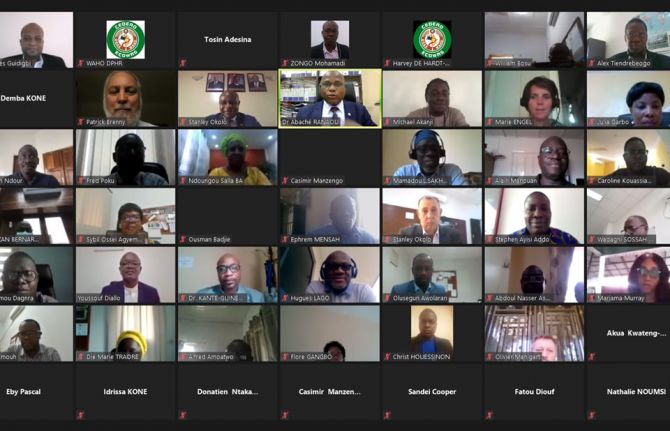
COVID-Blog
Virtual meeting on the impact of the COVID-19 on HIV programmes in the ECOWAS region
27 July 2020
27 July 2020 27 July 2020The West Africa Health Organisation (WAHO) organized, with support from USAID and UNAIDS, an online meeting with stakeholders in the Economic Community of West African States (ECOWAS) region—representatives of National AIDS Commissions, national AIDS and TB Coordinators in the Ministry of Health, and representatives from USAID, UN Agencies, civil society and the Global Fund—to share experiences and actions taken to mitigate the effects of COVID-19 on HIV programmes.
The discussions stressed the critical role that civil society is playing in mitigating the impacts of COVID-19 on HIV prevention, testing and treatment programmes, while at the same time, promoting the safety of staff and programme beneficiaries. A call was made for more political, technical, and financial support from governments and partners for community responses through delegation of tasks and decentralization of services.
Participants also agreed on the need to strengthen and pooling of laboratory resources and health products at the sub regional level as well as the need to establish a humanitarian corridor for the secure movement of health actors between borders and within countries specially in the multiple fragile situations in the region.
Other recommendations included expanding differentiated models of testing and care such as multi-month dispensing of HIV treatment and devising more effective ways to reach those left behind with equitable public and community services, including social safety nets, livelihood and economic empowerment programs, to mitigate both health and socio economic impact of COVID-19 and HIV.
The efficacy of using promising ICT innovations to reach key and vulnerable populations and to address critical programme and community needs, has been evidenced in all countries. A number of good practices were presented including the introduction or expansion of community antiretroviral distribution in Burkina Faso, Côte d’Ivoire, Guinea Bissau, Liberia, Mali, Nigeria, and Senegal; the increased use of peer supporters to improve linkages to care and create demand for services in Ghana; the virtual sensitization of key populations in Guinea Bissau; the use of WhatsApp to support counselling of people living with HIV in Togo; with the closure of bars, the renting of houses for sensitization activities and distribution of condoms in Guinea; the piloting of self- testing in Liberia; the opening of a hotline to communicate with people living with HIV, TB patients and key populations in Niger; the loan of antiretroviral drugs from The Gambia to Guinea Bissau to respond to stock outs; or the establishment of a supply chain situation room to ensure non-disruption in supply of HIV commodities at facility-level in Nigeria.






